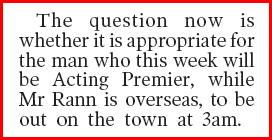A liberal Liberal. A heartening report in The Australian this morning that the new Victorian Premier is a different kind of Liberal to what we have federally. If Ted Baillieu does appoint the recently retired federal MP Petro Georgiou as his chief of staff we can be sure that this will be a small “l” administration.
Not really so clever. Liberals everywhere seem to think that the Victorian party decision to deny preferences to Greens candidates was some kind of clever masterstroke but I am not so sure. True it is that the decision prevented the Greens winning a lower house seat in the state parliament but if this preference policy becomes the party’s norm there will be much relief within the ranks of the real opponent. Labor would love to never again have to devote resources to hold on to the inner-city seats where the Greens are emerging as considerable vote winners. And resources not spent there are resources available to spend in other marginal electorates where Liberals are the enemy.
Journalism’s new puritans. Things are getting a bit grim when supposedly serious political journalists start condemning a politician for going out on the drink after a hard day at a Labor Party conference. South Australian Treasurer Kevin Foley had the misfortune in the early hours of Sunday morning to be king-hit as he walked down a city street looking for a taxi. And how did the Adelaide Advertiser react?

I mean, give us a break. Surely politicians are allowed to be people, too.
Changing the leaking game. It is not many years ago that it would have been virtually impossible to collect a quarter of a million documents for a whistleblower to publish. It would take too much time at the photocopier for one thing and difficult to smuggle them out of a building for another. Digital storage and transmission has clearly changed all that. And after this latest lot of WikiLeaks the game of diplomacy will surely be changed as well.
The days of secret diplomacy are coming to an end and there is no point arguing about whether that is a good or bad thing. We should now all accept the possibility that whenever we write something down and send it across a computer network that there will always be the possibility that it will end up becoming public knowledge.







how did the Crikey election indicator get the result so wrong?
If there’s any justice, muggers will hang around the Advertiser, looking for editors. Oh, and Acting Editors.
Charles
If the Crikey Indicator is to serve any purpose at all, and the probability of one side winning is 80%, then out of every 100 elections the other side will win 20 times. The Indicator would be, in your word, “wrong” if the so-called 80% chance won 100% of the time or 60% of the time. Somewhere on an old web site of mine I have a substantial number of election probabilities which I will try and dig out for you if you are interested. When I last did the figures there was a slight bias in the “indicator” towards understating the chances of the favourite winning but results like Saturday’s in Victoria help get the balance right.
Thanks for your interest.
Richard